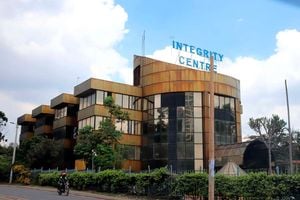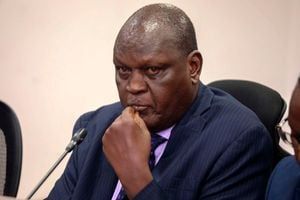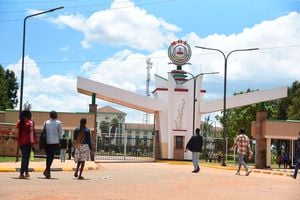
A view of Moi University Main Campus in Uasin Gishu County on October 27, 2021.
The management board of Moi University failed to implement recommendations made by the Ethics and Anti-Corruption Commission (EACC) following an audit of its operations in 2022, plunging the institution into its current problems.
The Nation has established that between October 26, 2022, and November 10 2022, the EACC carried out an investigation into Moi University’s operational and financial management systems, policies, and practices. This investigation revealed inherent weaknesses and corruption loopholes that needed to be fixed.
The EACC tasked the management of the university to develop and share an implementation plan for close monitoring but this was not done.
The EACC had reported weaknesses in supply chain management, citing interference with tendering processes, irregular variation of project costs, and delays in terminating contracts for leased facilities, vacation of buildings and handover of premises.
The agency moved in to carry out the investigation following a report of the Auditor-General on the university, that revealed Sh1.1 billion in pending bills as of June 30, 2020. The report noted that the university's financial and operational challenges made it technically insolvent. At the time of the EACC investigation, the university ran debts of up to Sh6.2 billion.
In its report dated May 2023, the EACC tasked Moi University Vice Chancellor Isaac Kosgey, as accounting officer, to implement the recommendations, which included strict adherence to Section 30 (d) of the Public Procurement and Asset Disposal Regulations, 2020 that among other things, prohibits direct communication with any of the tenderers participating in a tender.
High debt levels
The Auditor-General raised concerns over the sustainability of the university, high debt levels, un-remitted pension and other statutory deductions, stalled projects, and loss-making commercial ventures, among others.
The EACC is currently investigating top officials at the university over alleged embezzlement of Sh2.2 billion through fraudulent infrastructural projects. The commission has recorded statements from 59 people so far, including Prof Kosgey, chief accountant Egla Samoei, head of procurement Wilson Bett, and head of development unit Moses Kipkulei, who were all questioned last week.
This week, the commission will record statements from four members of the university council. Council chairperson Humprey Njuguna has been summoned alongside Prof Clara Momanyi, Charles Obiero, and Isaac Memusi to appear before the commission on Wednesday and Thursday.
Allegations against top university officials include irregular engagement with a private consultant, Habitech Consultants, deliberately avoiding the free services of professionals from the Ministry of Public Works.
In the 2022 investigation, the EACC noted that the university management had engaged one consultant for different projects, which included the construction of the amphitheatre building at the main campus in Kesses, Eldoret, Uasin Gishu County, the proposed refurbishment of the Moi University Technologies Digital Assembly at Rivatex Facility and construction of a gate at the main campus.
In academics, EACC investigators found that the university which was established in 1984 did not have a strategic plan and was using an outdated 2015-2018 academic calendar management.
Undergraduate exams
The strategic plan for 2015 – 2022 had expired by June 2022. The EACC report noted that failure to have a strategic plan in place was a weakness that led to a lack of strategic direction, resulting in the discretion in planning, budgeting and execution of programmes and activities in the university.
The investigators reported non-adherence to rules and regulations governing undergraduate examinations, graduations, and certification.
Further, they censured the management for failure to develop policies and procedure manuals such as procurement manual, fee payment policy, resource mobilisation policy, creditors management policy, and records management policy.
EACC investigators also found that management had neither reviewed nor conformed to the university’s master plan for the main campus land spanning over 3,000 acres, which was prepared in 1987. The university has not reviewed the master plan for the last 35 years and some developments are not in conformity with the plan.
The EACC is investigating among others, allegations of corruption and procurement irregularities in the proposed construction of the third and fourth floors of the School of Public Health, Dentistry and Nursing, and related works at the College of Sciences involving Sh726million.











